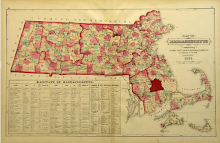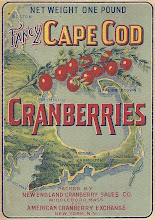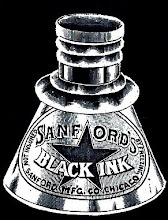 At the turn of the last century, Middleborough resident A. H. Dennett looked to awaken the community’s social and political conscience. Concerned about the conditions of the working class, Dennett, a market gardener who resided on Summer Street, was active in social democratic circles in the years immediately following 1900. In October, 1900, he was a keynote speaker at a social democratic rally in Cushing’s Hall in Middleborough, along with Isaac W. Skinner of Brockton. At the time, Dennett was running for the office of Massachusetts Representative for Plymouth District No. 7 (Halifax, Middleborough and Plympton). While his opponent Judge George D. Alden of Middleborough initially agreed to debate Dennett, Alden probably realized that such an act might provide Dennett with too much credibility as a candidate and he quickly rescinded his acceptance. The debate never came off.
At the turn of the last century, Middleborough resident A. H. Dennett looked to awaken the community’s social and political conscience. Concerned about the conditions of the working class, Dennett, a market gardener who resided on Summer Street, was active in social democratic circles in the years immediately following 1900. In October, 1900, he was a keynote speaker at a social democratic rally in Cushing’s Hall in Middleborough, along with Isaac W. Skinner of Brockton. At the time, Dennett was running for the office of Massachusetts Representative for Plymouth District No. 7 (Halifax, Middleborough and Plympton). While his opponent Judge George D. Alden of Middleborough initially agreed to debate Dennett, Alden probably realized that such an act might provide Dennett with too much credibility as a candidate and he quickly rescinded his acceptance. The debate never came off.The following year, in 1901, Dennett again ran for Representative, finishing third behind William Perkins, Jr., of Plympton (Republican), and Dr. T. S. Hodgson of Middleborough (Democrat). Undeterred, Dennett ran on the Social Democratic ticket for Massachusetts Secretary of State in 1902, again finishing third behind Republican William M. Olin of Boston and Democrat W. B. Stone, but ahead of candidates from the Socialist Labor and Prohibition parties.
Locally, Dennett proved the nemesis of more conservative-minded individuals in Middleborough, and in 1901 grocer Matthew H. Cushing appears to have been a particular antagonist. The 69-year-old Cushing was an astute politician, having served as a state representative, himself, as well as a member of the Governor's Council, and since 1867 he had operated a grocery store at the Four Corners.
For the town meeting of March, 1901, Dennett proposed by popular petition a number of warrant articles, moving that street laborers be paid $2 a day, that town employees be given an 8-hour work day and be paid 25¢ an hour, that the local street railway companies provide shelters for passengers along the line of their route, that future franchises for street railways make provision for the free transportation of public school children, that the town obviate future conflicts of interest by barring town officials from holding office with or receiving “emolument” from corporations holding or securing a franchise with the town, that the town provide caps and gowns for high school and grammar school graduates and that Middleborough Town Hall be “given free to the different political parties for the discussion of public questions.”
While, today, none of these proposals appear strikingly radical, at the time they were depicted as the vanguard of a larger socialist movement which threatened to overwhelm conservative Middleborough and they accordingly received great attention, eliciting considerable debate at the town meeting of March. And while the initial meeting passed several of Dennett’s motions, protracted proceedings forced its adjournment and the re-adjourned meeting ultimately overturned most of the previous meeting's actions. “The triumph of the followers of A. H. Dennett at the first meeting was short-lived, as the citizens were in an antagonistic mood and undid about all that the Dennetites accomplished” previously.
In response to Dennett’s proposal that day laborers working for the town (primarily in the street department) be paid $2 a day, grocer Matthew H. Cushing argued against the article, dismissing it as a “cranky socialistic idea.”
I will yield to no one in consideration for the laboring man, but I do not believe in favoritism. Let the pay be as before. The superintendent of streets can now hire at different prices and pay what a man is worth, while with this scheme all get $2 whether worth it or not. Why adopt class legislation? Is it for individual popularity? The town has run to my knowledge for 50 years without the intervention of these cranky socialistic ideas.
Dennett disputed Cushing’s characterization of the matter, stressing that the issue was strictly one of social justice, and he took umbrage of the depiction of socialism as cranky, making note of the strong social imperative within Christianity:
That’s right, gentlemen, but the Encyclopedia Britannica says that “the ethics of socialism and the ethics of Jesus Christ are identical.” “Woe unto ye, scribes, Pharisees, hypocrites, that devour widows’ houses and for a pretence make long prayers, for yours is the greater damnation.” Aren’t the town’s laborers entitled to a good living? Those who championed other appropriations, why don’t they support these? Could they live on $2?
Dennett’s last question was particularly pointed, given the fact that Cushing owned nearly $20,000 in property at the time, a considerable sum and one which would take a lifetime for a working man to accrue at the pay rate of $2 a day. When Dennett emphasized that he had witnessed first hand children employed in mines for meager pay, Cushing retorted, “That isn’t in Middleboro.” Dennett’s response was that “Middleboro does not constitute all the known world to others, even if it does to you.” The motion, nonetheless, was lost.
Dennett had equally poor luck with defending his effort to prevent conflicts of interest, though the warrant article, itself, appeared unimpeachable: “To see if the town will vote to amend the by laws of the town so as to forbid any official of the town holding any office of trust or emolument in any corporation holding or securing a franchise from this town.”
The ultimate failure of this article, however, had less to do with the result it sought to bring about and more with the fact that it was seen as being directed at one individual in particular who apparently held both a town office as well as a position of trust with an enfranchised company. Leading the opposition was Middleborough postmaster Augustus M. Bearse.
I do not see why the townspeople should vote to amend the by-laws in such a manner …. I do not believe that any of the town’s officials would use personal office for public gain. Furthermore, the official affected is one who has worked side by side with me, and has been one of the town’s best benefactors.
Bearse’s reasoning displayed a perhaps naïve view of public officialdom, though in his defense, voters during the period in question were less jaundiced regarding the political process. Consequently, the town meeting tabled the article, effectively killing it.
Bearse also opposed Dennett’s motion to require street railways to provide suitable shelters at the intersections of cross streets with the trolley lines outside the center of Middleborough. Bearse (who most likely only rode the trolley infrequently) argued that the company in question – the New Bedford, Middleboro and Brockton Street Railway – “intends to deal with fairness and generosity towards the town”, a sentiment again marked by a degree of naivete. While the original motion by Dennett had passed, Bearse was successful in persuading the town meeting to consider an alternate motion that the street railway “erect one or more booths between here and North Middleborough.”
The 1901 town meeting appears to have been the culmination of Dennett's efforts locally to persuade voters to adopt a social democratic platform. Just a few years later, Dennett would relocated to Virginia where he continued to labor for the Socialist Party.
Illustrations:
Sources:
Brockton Times, October 12, 1900; February 15, 1901; February 20, 1901; “Socialists Beaten”, March 18, 1901
International Socialist Review, 8:12, June 1908, pp. 722-24
A Souvenir of Massachusetts Legislators, 1901 (Stoughton, MA: A. M. Bridgman, 1901), p. 175
A Souvenir of Massachusetts Legislators, 1902 (Stoughton, MA: A. M. Bridgman, 1902), p. 129






















+of+Smoky+Mountains+018.jpg)
0 comments:
Post a Comment